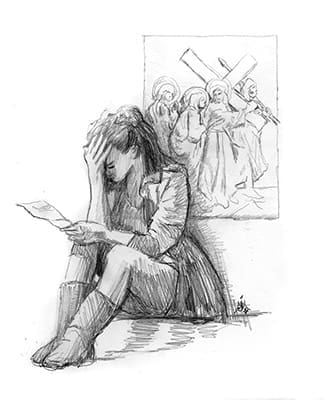Checking our hearts on Ash Wednesday
By Lorraine V. Murray, Commentary | Published February 25, 2019
When the engine light flashes red, we immediately take action to figure out what’s wrong. Same goes with the annoying beeping that tells us the smoke detector needs help.
Unfortunately, it’s all too easy to ignore warning signs that are spiritual. We can go sailing merrily along, humming “I’m OK—You’re OK,” but then comes Ash Wednesday, the day of reckoning.
 We will be entering the desert with Jesus for 40 days, and the desert is a quiet, lonely, somewhat treacherous place, where heavy baggage will drag us down. Ash Wednesday gives us a chance to peer inside our hearts and do an inventory.
We will be entering the desert with Jesus for 40 days, and the desert is a quiet, lonely, somewhat treacherous place, where heavy baggage will drag us down. Ash Wednesday gives us a chance to peer inside our hearts and do an inventory.
Are we clinging to old grievances and wrongs we’ve deemed too egregious to forgive? Perhaps we tell God, “Oh, yes, I know I’m supposed to forgive people, but this is a special case because these people really hurt me.”
This is a familiar excuse for me, because there’s a doctor whose arrogance may have hastened my husband’s death, and for three years I’ve held a grudge against this man.
Then I remember what Christ said: “If you love those who love you, what credit is that to you? For even sinners love those who love them.” Then he added, “Pray for those who mistreat you.”
I’ve heard these words read aloud many times at Mass, and yet somehow, I keep stalling.
“But, Lord, it’s so difficult!” I protest. “Give me more time, please.”
And I can imagine him replying, “Isn’t three years enough?”
The whole journey of the Christian life is to slough off the old, selfish self and become more like Christ. He didn’t procrastinate when it came to forgiveness, since he extended immediate mercy to the men who tortured and killed him.
Somehow, in light of his reaction, my refusal to forgive seems shockingly petty. The inescapable conclusion is that I can sacrifice my pride and stubbornness during Lent—and pray for the people who’ve wronged me.
Sometimes it’s one huge injury that has shattered your life, as in divorce, but it might also be a series of daily grievances.
As C.S. Lewis wrote, “It is perhaps not so hard to forgive a single great injury. But to forgive the incessant provocations of daily life—to keep on forgiving the bossy mother-in-law, the bullying husband, the nagging wife, the selfish daughter, the deceitful son—how can we do it?”
He suggests reflecting on the Lord’s Prayer, in which we say, “forgive us our trespasses as we forgive those who trespass against us.”
Jesus tells us about the outcome of forgiveness: “Your reward will be great and you will be children of the Most High, for he himself is kind to the ungrateful and the wicked.”
And then words that could be emblazoned on Lenten T-shirts: “Be merciful, just as your Father is merciful.”
The politicians whose viewpoints strike us as the essence of evil? Let’s pray for them. The bishops who have failed the church? Let’s pray for them.
The doctor who still makes me see red? Yes, I’ll pray for him.
A cross made of ashes is drawn on our foreheads to remind us we belong to Christ, and he belongs to us. We are committed to following him to the bitter end—the cross—where he extended mercy to men who had severely hurt him. Really, can we do any less?
Lorraine’s latest project is writing a study guide to accompany a video about Flannery O’Connor, which is part of Bishop Robert Barron’s series “Catholicism: The Pivotal Players.” Artwork is by Jef Murray.